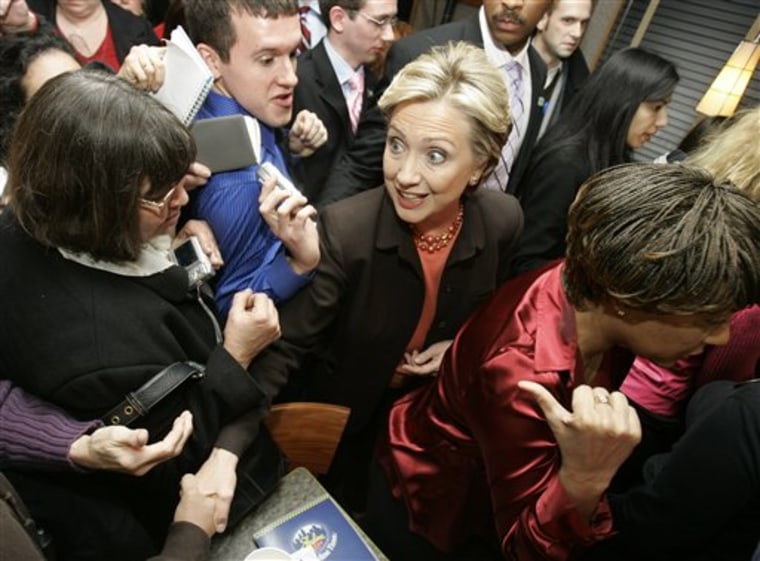Sen. Hillary Rodham Clinton declared herself the "candidate of, from and for the middle class of America" as she worked to keep her Democratic coalition in Ohio intact against a hard-charging Sen. Barack Obama.
Clinton has relied on working-class Democrats for much of her support in six weeks of presidential primary contests across the country and is counting on them even as Obama racks up important union endorsements.
The former first lady and New York senator is running a three-pronged strategy as she heads into the high-stakes March 4 primaries in Ohio and Texas. She is honing a tough new populist message, she is sharpening her criticism of Obama and she is presenting herself as the candidate who is better schooled in the intricacies of government policy.
"I've never seen a candidate so wealthy in information," Martha Hanon, a retired teacher, gushed to Clinton during a discussion Friday of economic issues in a packed chili restaurant here.
Clinton did show off her grasp of details, easily reciting facts and figures on subjects from foreclosure to foster care. The occasion was a round-table session designed to feature Clinton's proposal to address credit card abuses, but the discussion strayed to a variety of economic issues.
Showing her edge
As a whole, however, the session demonstrated Clinton's new approach. With the conversation on policy over, she easily slipped into her combative persona.
"We're going to end every single tax break that still exists in the federal tax code that gives one penny of your money to anybody who exports a job. Those days are done," she said, her voice rising. "It is wrong that an investment money manager in Wall Street making $50 million a year gets a lower tax rate than a teacher, a nurse, a truck driver, and autoworker making $50,000 a year."
"You know sometimes I hear people saying on TV or I read in the papers: 'Look she gets so intense, she gets all upset.' Well, you're right, I am upset!"
She then left her audience with what is becoming her standard anti-Obama line.
"This primary election offers a very big choice to the voters of Ohio," she said. "You can choose speeches or solutions."
Establishing differences
Clinton has been especially hitting Obama on health care, saying his proposal wouldn't achieve universal care because he does not require everybody to obtain health insurance. Clinton's plan has such a mandate, Obama's does not. Obama aims to make insurance more affordable by offering government subsidies to those who can't afford it.
Former President Clinton drove home that point in Texarkana, Texas on Friday.
"Her opponent excites more Americans ... but would in fact deny us universal health care coverage for the first time," Bill Clinton told about 200 people in a gymnasium of a Texarkana community center. "She represents the solution business."
Clinton advisers, conceding Obama's ability to motivate voters, say she needs to distinguish herself from Obama by stressing substance, offering more contrasts with her rival and making a direct appeal to workers.
But Obama, who has relied on a coalition of African-American voters and well-educated upscale Democrats, has been winning labor endorsements that could cut into Clinton's base of core supporters. On Friday, he was endorsed by the Service Employees International Union, a powerful political force with 1.9 million members.
Electability
Obama now leads the chase for nomination delegates 1,276-1,220. While Clinton aides have argued the importance of accumulating delegates, they are now beginning to emphasize the significance of the states she has won.
"We've learned there is this binary way that we're deciding who is doing well," said U.S. Rep. Anthony Weiner, D-N.Y., an informal adviser who was traveling with Clinton. "One is the delegate count and the other is winning states."
Clinton has won large states such as California, New Jersey and her home state of New York. Winning Ohio and Texas would be additional big prizes.
"These are the states that Democrats have to do well in if we're going to win the presidency," Weiner said.
Public polls place Clinton comfortably ahead in Ohio, but Weiner and others predicted that the race would tighten significantly in the state.
Tim Kraus, the president of the Cincinnati Federation of Teachers, illustrated the challenge facing Clinton. The American Federation of Teachers, Kraus' national organization, has endorsed Clinton. But Kraus is undecided and said his local is not likely to endorse at all.
"There's some strong, compelling reasons to stay with the decision of the union," he said. "But I have to admit that Obama has a lot of appeal."
Kraus was at Clinton's morning session at Skyline Chili in Cincinnati. Friday night he planned to listen to Obama's wife, Michelle, speak at a music hall. He said he expected the 5,000-person venue to be filled.
